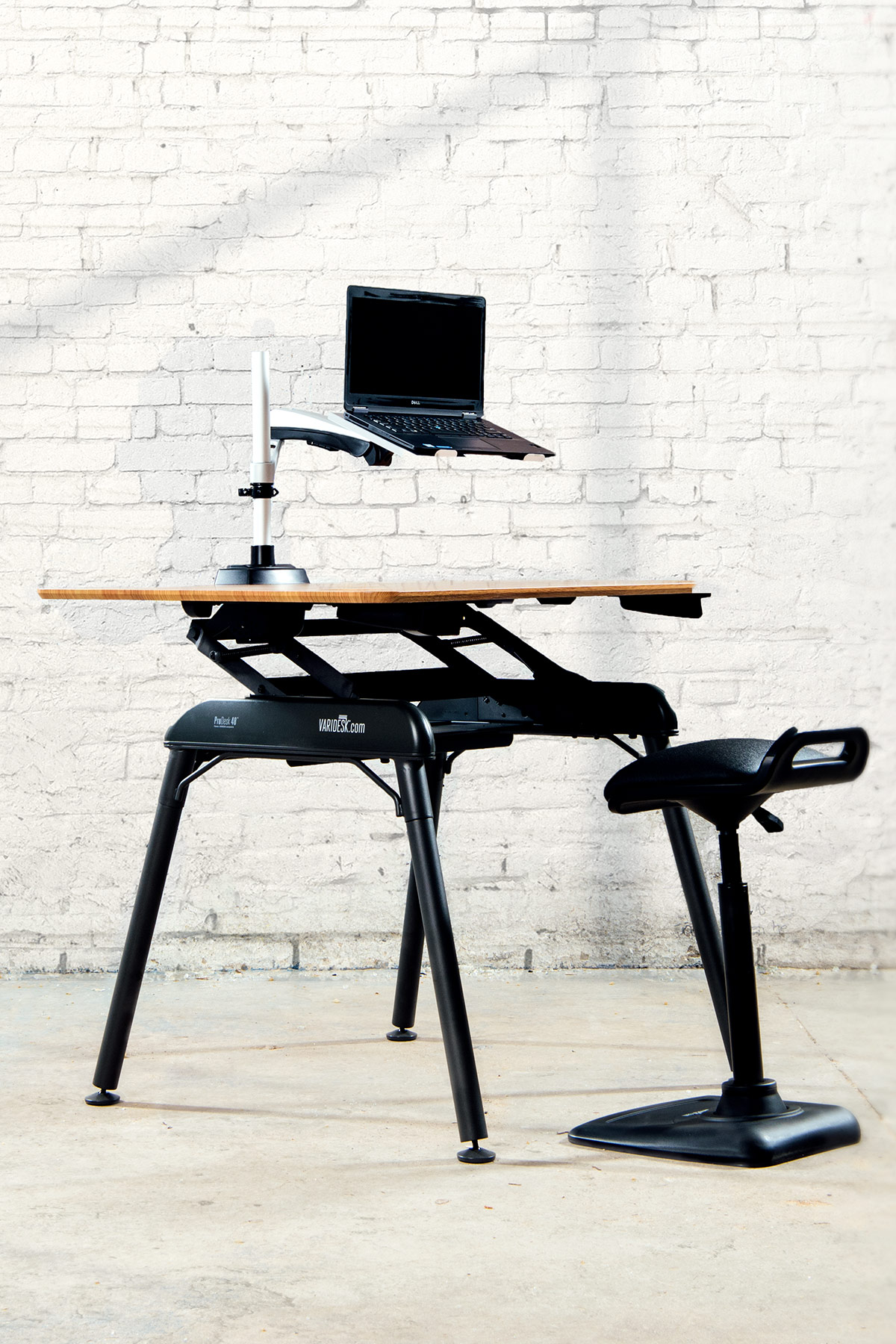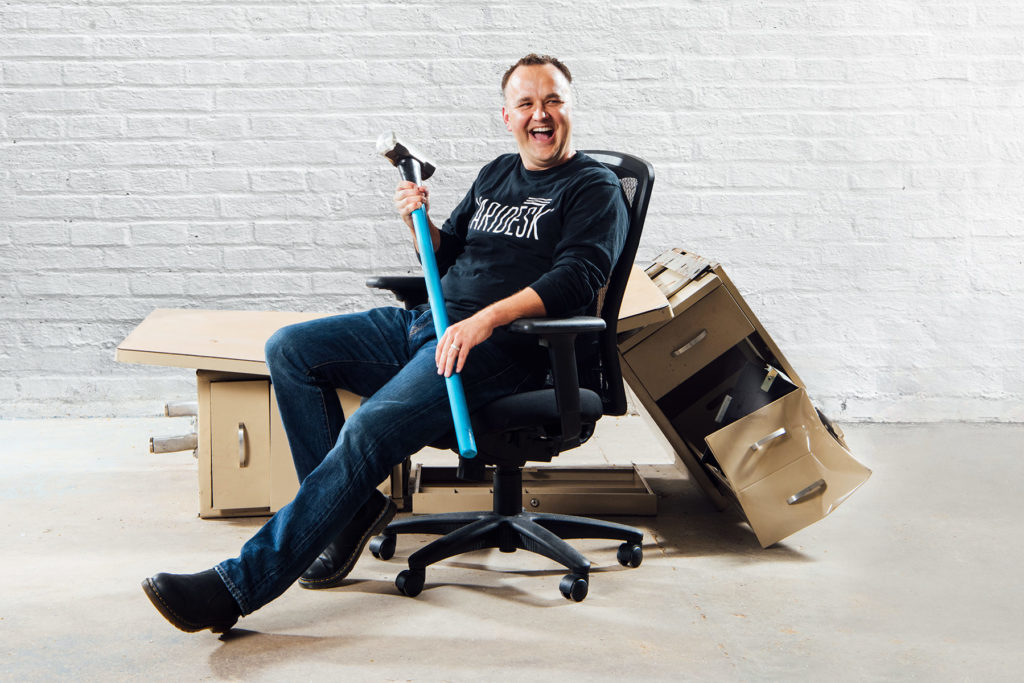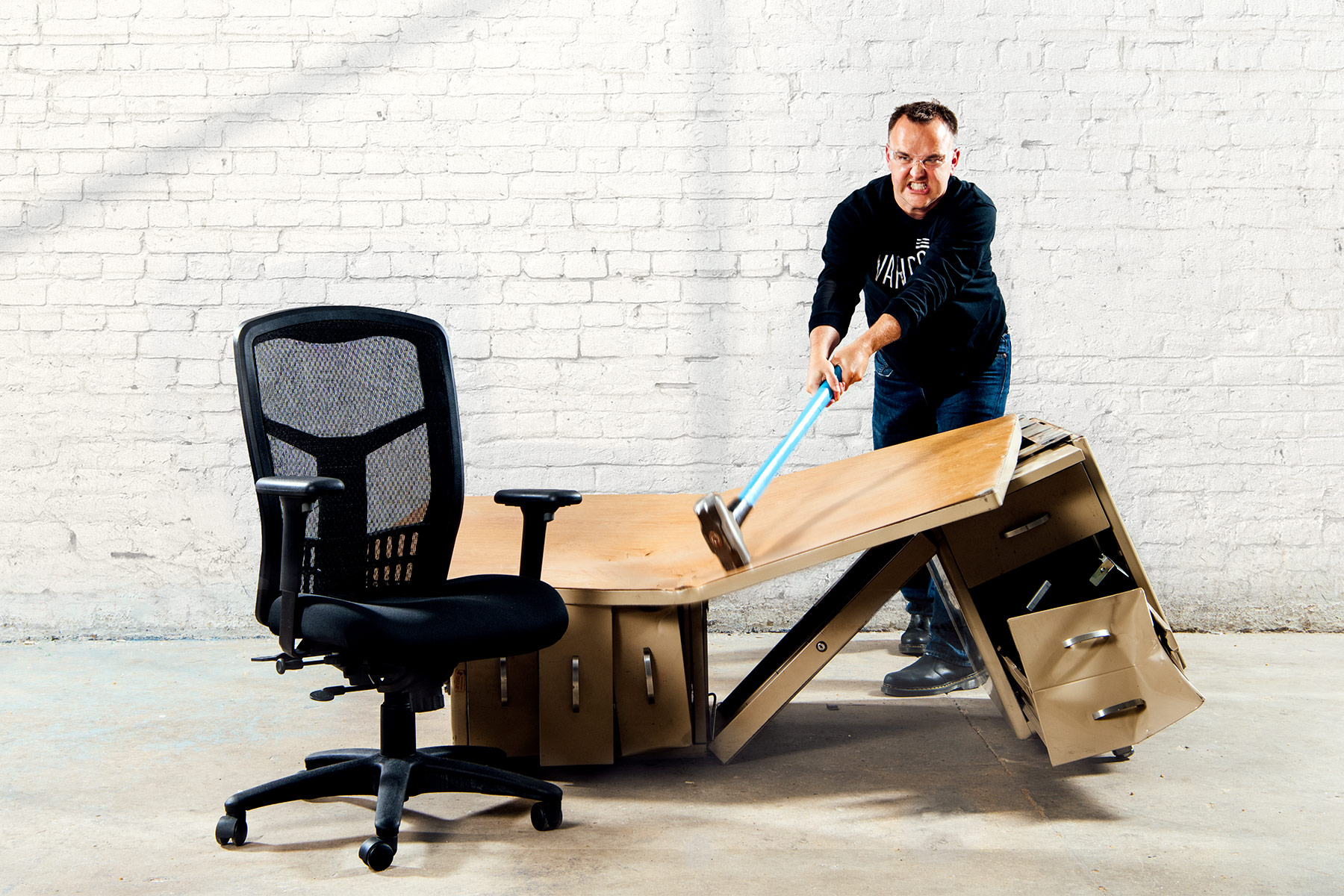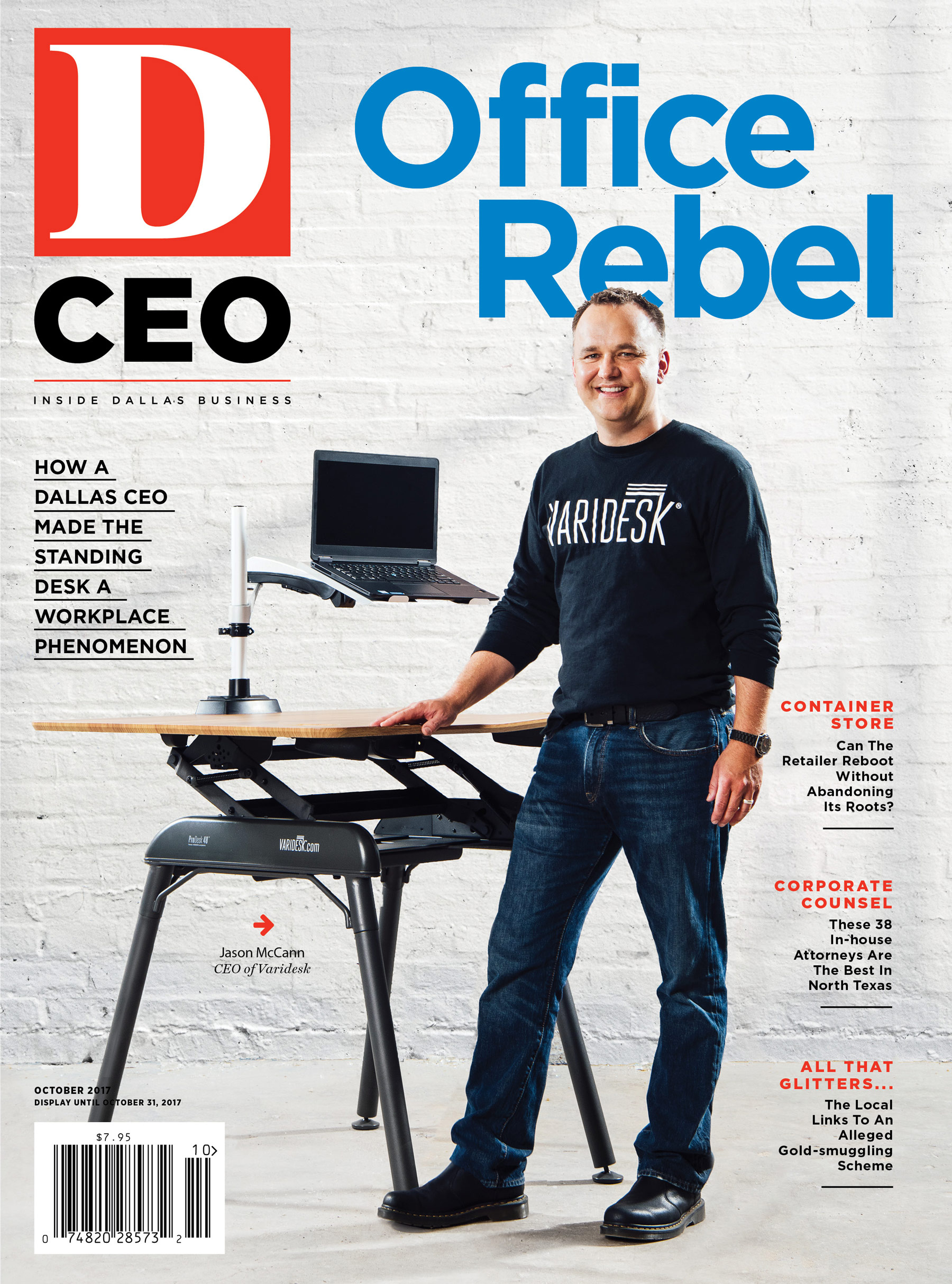Varidesk CEO Jason McCann and company owner Dan Flaherty were kicking ideas around in their Coppell office one day in 2012 when their blockbuster product began taking shape.
Flaherty, a serial entrepreneur whose holiday decorations and novelties company has a long history of invention, had been diagnosed with sciatic nerve pain. After months of being uncomfortable at work, a physical therapist told him to use a standing desk to relieve his discomfort at the office.
“It was like a sign from God—our ‘Aha!’ moment,” recalls McCann. “We were on to something.”
Unhappy with his options for standing desks—which ranged from putting his computer on a cardboard box to elaborate motorized executive desks—Flaherty got together with McCann and their head of design to sketch out an alternative.
“I remember Dan sitting there describing the product: ‘Can it come out of a box and sit on top of my desk and not have to be bolted down? Can it just pop up in a second? Do you need a motor?’” recalls McCann, who was then president of Gemmy Industries, Flaherty’s holiday decorations company. The design that eventually emerged for what’s now called Varidesk ships fully assembled, mounts on top of existing desks, and is raised manually to standing height. “It’s those moments you remember,” says McCann. “It was the birth of an awesome product.”
A few months after they settled on their prototype, McCann came across a news article that described sitting as “the new smoking.” It reported on Mayo Clinic research that linked sitting for long periods with health concerns including obesity, high blood pressure, and abnormal cholesterol levels. “It was like a sign from God—our ‘Aha!’ moment,” recalls McCann. “We were on to something.”
Today, Varidesk has notched its millionth sale and, last November, was named the fastest-growing entrepreneurial company in Dallas by the Southern Methodist University Cox School’s Caruth Institute for Entrepreneurship. In June, EY picked McCann and Flaherty as Entrepreneurs of the Year in the emerging consumer products category in the Southwest regional competition.
McCann, who’s the public face of the company, with owner Flaherty preferring to stay in the background, says a fast-growing enterprise always has challenges, but Varidesk’s problems have been “mostly the good kind”—at least, after the company figured out how it was going to compete in the office furniture market.
At first, McCann says, they tried selling their desks through office furniture dealers. “We got a lot of head nods, but we were told, ‘First you have to raise your price, because we sell on list-and-discount.’ That went against my core principles of transparency in business. The second problem is, they didn’t sell any product. Four or five companies, great companies, control more than 50 percent of that market. We couldn’t break through, so we decided to go straight to the customer.”
The direct-sales model, with web-based sales and a direct relationship with the consumer, has been a perfect match for a product like Varidesk’s adjustable standing desk. An individual in a company would buy one, and all of a sudden he or she would be standing up in the office—and difficult not to notice. “It would catch on and work its way to into [human resources offices], so we’d have entire departments putting in a purchase order. We started in companies like The Container Store, American Airlines, and Mary Kay, and expanded from there,” McCann says. He declined to reveal sales and revenue figures, or any other financial details for the company.
Varidesk’s entire workforce is housed in the same building in a Coppell business park. From the outside, the gray stone structure looks perfectly ordinary, maybe even a tad dreary. Once past the front desk and the lobby coffee bar, though, it’s as if one were zapped into a hip, up-to-the-second workspace in Soho or Palo Alto. Much of the main open space is given over to sales and customer service people, who sit or stand at Varidesks layered on tan wood-topped tables. Around the edges of the room stand a few London style phone booths—painted blue—for making private phone calls.

The headquarters office, which also serves as a massive showroom, exhibits an array of Varidesk products: glass-walled room dividers, ceiling lights that look like floating halos, and stool-like chairs that the company has added to its expanding product line. The only employee whose office includes a door is the human resources director, who sometimes has no choice but to talk discreetly.
“I never thought you could run a global entity from here, but today you can,” says McCann. With the internet and voice-over-IP, worldwide logistics and warehouses, and production at Chinese factories that Gemmy has done business with for decades, “it’s allowed us to scale very quickly,” McCann says. “And it’s been an amazing market in which to get talent,” he says of the workforce, which numbers 160. The sales force arrives in ’round-the-clock shifts to handle European and Australian customers.
“Now we have people [coming] from all over the world to tour our facility and see how they might reimagine their workspace,” says McCann. “You can’t do this in every market. It’s an affordable space. Dallas has been very, very good for us. We love being here.”
One afternoon in May, one visitor touring the offices just so happened to be Daymond John, founder of FUBU clothing, an investor, and a cast member on the TV series “Shark Tank.” After taking selfies with Varidesk employees and giving a short talk to the group, John and some of his staff arrayed themselves around a conference table to talk about why they’re customers. (The conference table, by the way, is at standing height, an arrangement McCann says makes for shorter, crisper meetings.)
John explains that he’s outfitted two offices with Varidesk products: one for his investment staff, and one for blueprint + co, a co-working space he’s developed in New York and expects to open in other cities.
The inspiration to do so came from the same place as the invention—a staffer with a back problem—but John says he sees wider health and attitude benefits with his staff using standing desks. “It’s a subtle change, but I see a lot more activity in the office. They aren’t sitting hunched over,” he says. “I have bad posture, because half the time I was hunched over my desk. Now I have a fitbit [activity tracker], and if I’m not already standing and moving around, the desk helps get me there. It’s like they’re in cahoots.”
John, who says he’s simply a client and has no other business with Varidesk, says his co-working spaces are designed to have successful mid-career entrepreneurs as tenants rather than startups, which are more typical clients for shared office spaces. “I want to be able to have a community of like-minded people thinking about ways to serve their communities and grow a business. I like surrounding myself with these kind of individuals,” he says, naming several who are clients.
McCann says John’s requirements ended up shaping Varidesk’s offerings and stand as a good example of how customer feedback has helped influence the company. “You don’t realize how tight space can be in New York, and when they came to Coppell to talk to us, they said they needed 48-inch desks,” McCann says. “Our Pro desk came in 60 inches. So we all went out to Hard Eight BBQ for lunch while, back at the office, I had them cut a desk down to 48 inches and paint the edges. When we came back we said, ‘Here it is,’ and it was the product they wanted. We shook hands and they’re a customer.”
John says that while Varidesk is a fast-growing startup, it doesn’t operate like one, because “it’s not the first time they’ve scaled a business.” To be sure, McCann’s business experience seems to go well beyond his 46 years.
McCann’s first taste of the working world came as a floor sweeper in his mother’s beauty shop in Galveston. He moved from there to setting up umbrellas and beach chairs, recalling, “I stuck umbrellas in the sand for 20 bucks a day. I worked all day and loved it. I was 15, so you really couldn’t get a real job.”
Soon he was renting his own stretch of sand and running his own beach umbrella concession “for more than 20 bucks a day.” The experience started him thinking about a career in the hospitality business. So, after graduating from high school in 1988, he enrolled in the University of Houston’s hotel management program and went to work after graduation managing a Houston reggae-themed bar.
“It was a fun two and a half years, but I realized I just didn’t love the club and restaurant business,” he recalls. So he went back to the Houston university for an MBA and happened upon an item that sent him careening toward his eventual career path.
“A guy from the bar owed me some money, and he paid me in pogs,” McCann recounts, referring to the coin-sized cardboard milk caps that turned into a collectors’ fad in the 1990s. As a grad student studying consumer products and entrepreneurship, McCann was soon designing new games using pogs. He took some of his ideas to a local toy company, DSI Toys, and got a meeting with owner Richard Neitz.
“Rick said, ‘Pogs are dead, but you need to work here,’” McCann recalls of Neitz. “I said, ‘I’ll do any jobs you ask me to.’” So he worked in the warehouse, learned to sell to Wal-Mart, sold Baby Learns to Walk on QVC, managed a Kawasaki-tied boys line, and learned how to fly to China and negotiate deals with factories. “Rick took me under his wing,” he recalls of Neitz, who passed away in 2015.

In the late 1990s DSI began contemplating going public and, at a meeting with potential investors, McCann met Flaherty, owner of Coppell-based Gemmy. Flaherty had started his company in 1984 and grew it over the years from a novelty products business—with boom and bust items such as Big Mouth Billy Bass, an animated trophy fish that sang “Take Me to the River”—to a company focused on innovative Christmas and Halloween decorations. “Dan and I connected at the meeting, even though he didn’t end up investing in DSI,” McCann says.
In 1999, McCann began talking with Flaherty about joining Gemmy. He turned down Flaherty’s first offer, to head up Gemmy’s marketing effort, but he bit on the idea of a dot-com startup, which was completely in step with the times. It turned out iCelebrate.com was built “like every other dot-com,” McCann says, with outside investors and inventory stacked deep and a business model that was clearly unsustainable. “I remember talking with investors and a guy told me, ‘It’s over. The internet thing is over,’” McCann says. Within a month he was unwinding the company and laying off its 50 employees.
McCann moved over to Gemmy to, in his words “help with some marketing and product development,” and ended up “falling in love with the business and the people there.” In the early 2000s, the company’s workforce doubled to about 100 on the strength of one of its inventions: inflatable yard decorations. Gemmy pioneered the giant Santas, reindeer, snow globes, penguins, and spooky cats that are now a staple of suburban holiday lawn decorating.
After nearly a decade as vice president of marketing, McCann was promoted to president, and Flaherty turned the company over to him while he took his family on a six-month around-the-world vacation. “One of the hardest things for an owner to do is turn over the reins of a company you have brought from zero to whatever. It’s your baby,” Flaherty says. “Handing it over to him turned out to be one of the best things I ever did for my family and my business.”
Flaherty says he was struck by McCann’s maturity on first meeting him in the late ’90s. As president of Gemmy—and later as CEO of Varidesk—McCann has had strong ideas about how to build a successful culture, Flaherty says. “He’s one to reward people if they’re doing a great job and, if not, he’s going to coach you off the team,” says Flaherty. He’s also never content with what he already knows, Flaherty adds: “There’s no business book he hasn’t read.”
By all accounts, McCann is a natural extrovert who doesn’t seem to take himself too seriously. After installing a number of desks in the New York offices of The Onion, the satirical news publication, he let them use his image in some of their items. “Typically, my head is photoshopped,” McCann says. “I’m a random middle-aged guy. It’s funny, so it’s all right.”
At the office, McCann usually wears a black Varidesk t-shirt, jeans, and hiking boots. If there’s a meeting, he’ll wear a black collared shirt. “When I turned 40, I decided to give up drinking and simplify everything,” the 57-year-old McCann says. “I simplified my wardrobe. It cleanses your headspace and frees you up to think about other stuff. It’s almost a joke now, but Steve Jobs did it and it makes perfect sense to me.”
Pointing to his black collared shirt, he says, “I have 15 of these I bought on Amazon.” If he had his choice he’d eat eggs and avocado for breakfast every morning and sushi for every lunch, and he often does. He tries to keep a 6:30 dinnertime at home with his wife, Cari, and their three kids, ages 12, 14, and 16. To keep up with his kids, he blends in some Top 100 pop tunes with his preferred Pandora mix of James Taylor and other ’70s artists.
“Right now we’re [selling to] 96 percent of the Fortune 500,” McCann says. “We have 20 left, and we’re gonna get them all.”
McCann’s unbuttoned style works well with Varidesk’s workforce, which Flaherty describes as “85 to 90 percent millennials.” This younger cohort “brings a lot of energy and excitement, but they also bring their challenges. How do you retain them and make sure they are happy and working hard? That is the challenge,” Flaherty says.
McCann says he expects Varidesk to grow by about 40 employees, to a total of 200, by next year. He likes interviewing every potential hire, he says, “because it’s so important to get the right people.”
Hiring in a tight job market has been one growing pain, as has protecting the company’s intellectual property. Over the last two years, Varidesk has brought several lawsuits for patent and copyright infringement against both U.S- and China-based competitors. It has settled several suits while others remain pending.
Another bump in the road came with one of Varidesk’s early sales efforts. In targeting business travelers, the company set up displays at several airports and became one of the most successful products in SkyMall in-flight sales catalogs. When SkyMall filed for Chapter 11 bankruptcy in early 2015, McCann recalls, it owed Varidesk hundreds of thousands of dollars: “It’s one of those things. You can’t let other people hold your money for too long.”
Still, as a company that developed under Gemmy’s wing and has not needed to go to the markets for capital, Varidesk has been able to concentrate on nurturing its “culture of innovation,” developing new products, and expanding its line and sales reach. “Right now we’re [selling to] 96 percent of the Fortune 500,” McCann says. “We have 20 left, and we’re gonna get them all.”






